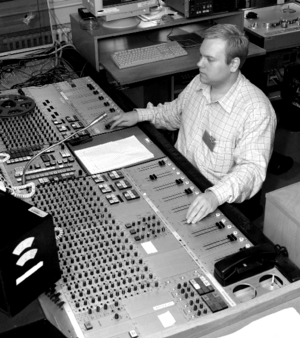Audio engineer facts for kids
An audio engineer is a person who works with sound. They operate, choose, and set up equipment for recording sound. Most audio engineers work in a recording studio. However, they can also work in other places. For example, they might work at live concerts or for TV shows. An engineer might create recordings with many different sound tracks. They also work with stereo sound or create remixes of songs.
Audio engineering is all about recording and playing back sound. This involves using both mechanical and electronic tools. It's a part of audio science. This job uses ideas from many areas. These include electrical engineering, acoustics (the science of sound), and music. An audio engineer focuses on the creative and technical parts of sound. This is different from an acoustical engineer, who studies how sound behaves.
Contents
How do audio engineers learn?
Some audio engineers learn on their own. They learn by doing the work or by reading instruction manuals. Many start in other jobs at a studio. They might run errands and learn about recording as they go. An engineer learns how to use microphones and where to place them. They also learn to use and take care of an audio mixer. They work with recording machines and sound effects. They know how to switch between live and recorded sounds. This helps them make the best and most unique recordings. A good engineer wants recordings to sound great and be technically perfect.
What kind of jobs do audio engineers have?
Starting out in recording studios can mean low pay. Many beginners even work as volunteers for free. But experienced engineers can earn a lot of money. Especially if they have worked on a hit record. Some engineers get a regular salary. Others are paid by the hour or per recording session. Many engineers eventually start their own recording studios. Some have a private studio or offer mobile recording services. A few work only for one artist, band, or producer.
Where can you study audio engineering?
Many colleges and universities offer classes in recording. These classes might teach about the history of recording. They also cover different techniques and technical knowledge. Some schools offer full degrees or diplomas in Recording. Finishing such a program does not promise a studio job. But it does make your chances better. It can also prepare you well for this career.
Other jobs for audio engineers
Besides studio work, some engineers have special skills. They might create new digital versions of old recordings. Some work as consultants for places that hold concerts. They help with live performances. Sometimes, they even act as expert witnesses in court trials. This happens when sounds or a recording are important to a case.
Equipment an Audio Engineer Uses
- Microphones: These turn sound into electrical signals.
- Mixing consoles: These let engineers combine and control different sounds.
- Signal processors: These change how sounds are heard.
- Digital audio workstations: Computer software for recording and editing sound.
- Music sequencers: Tools for creating and arranging music.
- Speakers: To play back the recorded sound.
- Preamplifiers: These make weak sound signals stronger.
- Amplifiers: These make sound signals powerful enough for speakers.
Related pages
Images for kids
-
Acoustic diffusing mushrooms hanging from the roof of the Royal Albert Hall.
See also
 In Spanish: Ingeniero de audio para niños
In Spanish: Ingeniero de audio para niños








